牛津英语小学基础语法大全
(完整版)上海牛津小学英语语法知识总结

上海牛津小学英语语法知识总结一般现在时1、定义:表示经常发生或习惯性的动作、状态。
句中通常有usually,often,every day,sometimes,always,at weekends,on Sundays等表示经常性时间的短语。
2、构成:1)当谓语是be动词时,一般现在时的构成:主语+be动词+其他如:I am a student. He is Jim’s father.They are from Japan.2)当谓语是行为动词时,一般现在时的构成:①主语(非第三人称单数)+动词原形+其他如:I often watch TV at the weekends.Mr Green and Mrs Green like collecting stamps.②主语(第三人称单数)+动词的第三人称单数形式+其他如:Jim usually visits his grandparents on Sundays.She sometimes goes to the park with her mother.3、动词三单形式的变化规则:•一般情况下,直接加s 如:read-reads,swim-swims•以s,x,sh,ch,o结尾,加es 如:wash-washes,watch-watches,do-does•以辅音字母+y结尾,变y为i,再加es 如:study-studies,fly-flies•不规则变化如:have-has4、一般现在时的句型转换:肯定句否定句一般疑问句及回答They watch TV every day. They don’t watch TVevery day.—Do they watch TV every day?—Yes, they do. / No, they don’t.She watches TV every day. She doesn’t watchTV every day.—Does she watch TV every day?—Yes, she does. / No, she doesn’t.现在进行时1、定义:表示现在或现阶段正在进行或发生的动作。
上海牛津小学英语语法知识总结
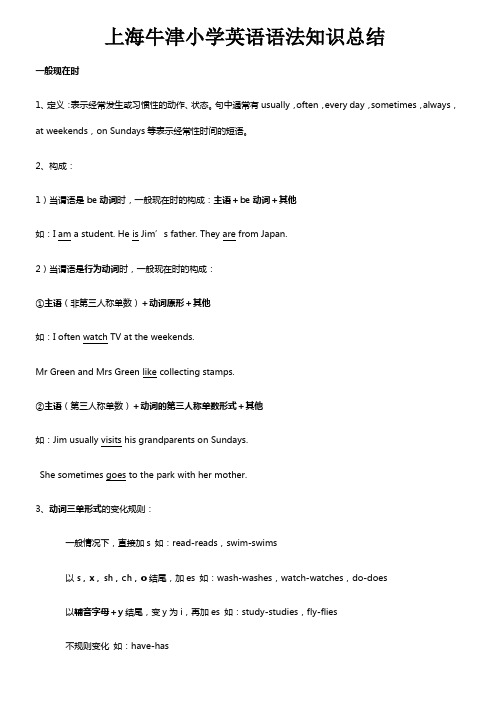
上海牛津小学英语语法知识总结一般现在时1、定义:表示经常发生或习惯性的动作、状态。
句中通常有usually,often,every day,sometimes,always,at weekends,on Sundays等表示经常性时间的短语。
2、构成:1)当谓语是be动词时,一般现在时的构成:主语+be动词+其他如:I am a student. He is Jim’s father. They are from Japan.2)当谓语是行为动词时,一般现在时的构成:①主语(非第三人称单数)+动词原形+其他如:I often watch TV at the weekends.Mr Green and Mrs Green like collecting stamps.②主语(第三人称单数)+动词的第三人称单数形式+其他如:Jim usually visits his grandparents on Sundays.She sometimes goes to the park with her mother.3、动词三单形式的变化规则:一般情况下,直接加s 如:read-reads,swim-swims以s,x,sh,ch,o结尾,加es 如:wash-washes,watch-watches,do-does以辅音字母+y结尾,变y为i,再加es 如:study-studies,fly-flies不规则变化如:have-has4、一般现在时的句型转换:肯定句否定句一般疑问句及回答They watch TV every day.They don’t watch TVevery day.—Do they watch TV every day—Yes, they do. / No, they don’t.She watches TV every day.She doesn’t watchTV every day.—Does she watch TV every day—Yes, she does. / No, she doesn’t.现在进行时1、定义:表示现在或现阶段正在进行或发生的动作。
牛津小学英语语法点汇总
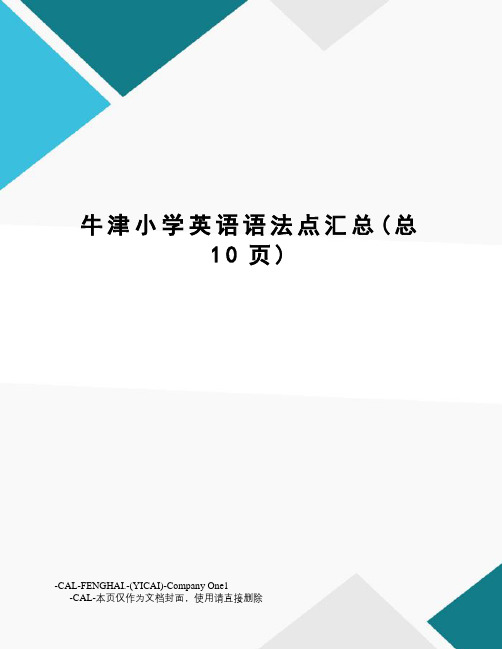
牛津小学英语语法点汇总(总10页)-CAL-FENGHAI.-(YICAI)-Company One1-CAL-本页仅作为文档封面,使用请直接删除语法及练习1 be动词Be 动词的用法:(1) Am--was Is --was Are--were 口诀:我用am, 你用are, is用在他她它,复数全用are。
(2) 肯定和否定句 I am (not) from London. He is(not) a teacher. She is(not) in the dining room. My hair is(not) long. Her eyes are(not) small.(3) 一般疑问句Am I a Chinese Yes, you are. No, you aren’t. Are they American Yes, they are. No, they aren’t. Is the cat fat Yes, it is. No, it isn’t.用恰当的be动词填空。
1. I ______ a boy. ______ you a boy No, I _____ not.2. The girl______ Jack's sister.3. The dog _______ tall and fat.4. The man with big eyes _______ a teacher.5. ______ your brother in the classroom6. Where _____ your mother She ______ at home.7. How _______ your father8. Mike and Liu Tao ______ at school.9. Whose dress ______ this10. Whose socks ______ they11. That ______ my red skirt.12. Who ______ I13.The jeans ______ on the desk.14. Here ______ a scarf for you.15. Here ______ some sweaters for you.16. The black gloves ______ for Su Yang.17. This pair of gloves ______ for Yang Ling.18. The two cups of milk _____ for me.19. Some tea ______ in the glass.20. Gao shan's shirt _______ over there.21. My sister's name ______Nancy.22. This ______ not Wang Fang's pencil.23. ______ David and Helen from England24. There ______ a girl in the room.25. There ______ some apples on the tree.`26. _______ there any kites in the classroom27. _______ there any apple juice in the bottle28. There _______ some bread on the plate.29. There _______ a boy, two girls, three men and ten women in the park.30. You, he and I ______ from China.语法及练习2 人称代词和物主代词人称代词和物主代词1.人称代词主格和宾格的区别:主格通常位于句中第一个动词之前(有时候位于than 之后),宾格一般位于动词或介词之后。
小学牛津英语语法大全精心整理版
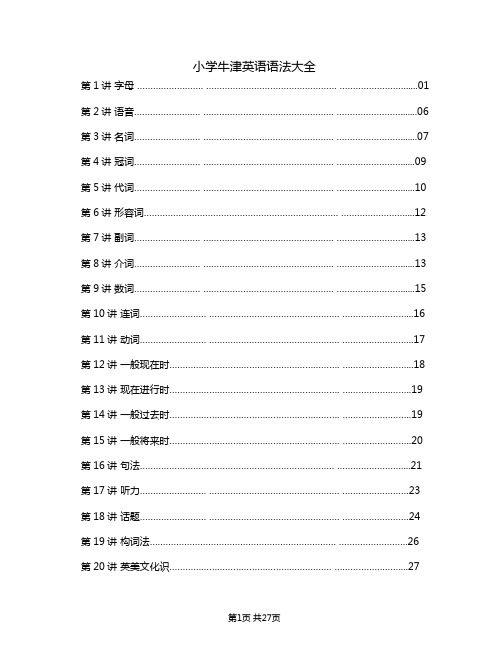
小学牛津英语语法大全第1讲字母......................... ................................................. (01)第2讲语音......................... ................................................. . (06)第3讲名词......................... ................................................. . (07)第4讲冠词......................... ................................................. (09)第5讲代词......................... ................................................. (10)第6讲形容词......................................................................... . (12)第7讲副词......................... ................................................. (13)第8讲介词......................... ................................................. (13)第9讲数词......................... ................................................. (15)第10讲连词......................... ................................................. (16)第11讲动词......................... ................................................. (17)第12讲一般现在时................................................................ (18)第13讲现在进行时................................................................ .. (19)第14讲一般过去时................................................................ .. (19)第15讲一般将来时................................................................ .. (20)第16讲句法......................................................................... . (21)第17讲听力......................... ................................................. . (23)第18讲话题......................... ................................................. . (24)第19讲构词法...................................................................... .. (26)第20讲英美文化识............................................................. . (27)第1讲字母1. 英语中共有26个字母。
上海牛津小学英语语法知识总结

上海牛津小学英语语法知识总结上海牛津小学英语语法知识总结一般现在时1、定义:表示经常发生或习惯性的动作、状态。
句中通常有usually,often,every day,sometimes,always,at weekends,on Sundays等表示经常性时间的短语。
2、构成:1)当谓语是be动词时,一般现在时的构成:主语+be动词+其他如:I am a student.He is Jim’s father.They are from Japan.2)当谓语是行为动词时,一般现在时的构成:①主语(非第三人称单数)+动词原形+其他如:I often watch TV at the weekends.Mr Green and Mrs Green like collecting stamps.②主语(第三人称单数)+动词的第三人称单数形式+其他如:Jim usually visits his grandparents on Sundays.She sometimes goes to the park with her mother.3、动词三单形式的变化规则:一般情况下,直接加s 如:read-reads,swim-swims以s,x,sh,ch,o结尾,加es如:wash-washes,watch-watches,do-does以辅音字母+y结尾,变y为i,再加es如:study-studies,fly-flies不规则变化如:have-has4、一般现在时的句型转换:肯定句否定句一般疑问句及回答They watch TV every day. They don’t watch TVevery day.—Do they watch TV every day—Yes, they do. / No, they don’t.She watches TV every day. She doesn’twatchTV every day.—Does she watch TV every day—Yes, she does. / No, she doesn’t.现在进行时1、定义:表示现在或现阶段正在进行或发生的动作。
上海小学牛津英语语法归纳总结
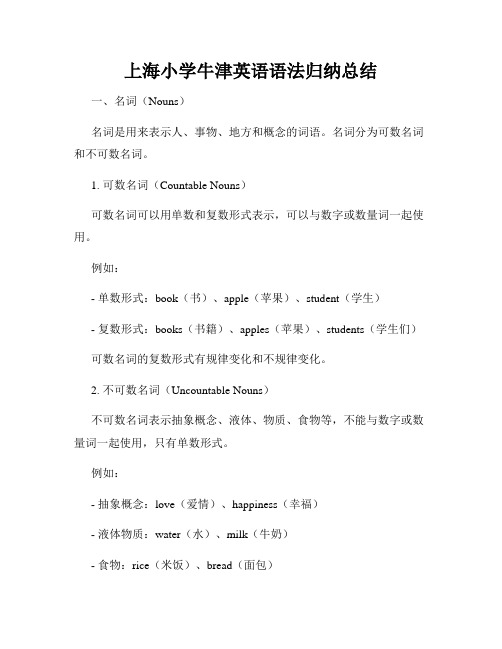
上海小学牛津英语语法归纳总结一、名词(Nouns)名词是用来表示人、事物、地方和概念的词语。
名词分为可数名词和不可数名词。
1. 可数名词(Countable Nouns)可数名词可以用单数和复数形式表示,可以与数字或数量词一起使用。
例如:- 单数形式:book(书)、apple(苹果)、student(学生)- 复数形式:books(书籍)、apples(苹果)、students(学生们)可数名词的复数形式有规律变化和不规律变化。
2. 不可数名词(Uncountable Nouns)不可数名词表示抽象概念、液体、物质、食物等,不能与数字或数量词一起使用,只有单数形式。
例如:- 抽象概念:love(爱情)、happiness(幸福)- 液体物质:water(水)、milk(牛奶)- 食物:rice(米饭)、bread(面包)不可数名词没有复数形式,不能直接与冠词a/an连用。
二、冠词(Articles)冠词用于限定名词的范围,分为定冠词和不定冠词。
1. 定冠词(Definite Article)定冠词是"the",用于特指已经提到的人或物,或者特指上下文中的某人或某物。
例如:- I saw a cat in the tree.(我看到树上有一只猫)- The cat was black.(那只猫是黑色的)2. 不定冠词(Indefinite Article)不定冠词有两种,分别是"a"和"an"。
用于泛指某一类人或物。
例如:- I have a dog.(我有一只狗)- She is an actress.(她是一名女演员)不定冠词"a"后面接辅音音素开头的词,"an"后面接元音音素开头的词。
三、形容词(Adjectives)形容词用来描述名词的特征和性质。
形容词通常位于名词之前。
- a big house(一个大房子)- a beautiful flower(一朵美丽的花)形容词可以用于比较级和最高级。
牛津小学英语语法复习

牛津小学英语语法复习-CAL-FENGHAI.-(YICAI)-Company One1牛津小学英语语法复习一、时态1.一般现在时(1)表示经常发生的动作或事情,通常用“usually, often, every day, sometimes,always,never”等词。
2.现在进行时,(1)表示正在发生的动作,通常用“now,look”.(2)基本形式: be + 动词+ingeg: I am(not) doing my homework.You/We/They are(not) reading.He/She/It is(not) eating.What are you doingIs he reading3. 一般过去时态(1)表示过去已经发生的事情,通常用“last week, just now, yesterday”等词。
(2) be 动词的过去式: am/is—was are—wereI/He/she/it was(not)…. You/we/they were….一般疑问句was, were 放在句首。
(4)动词过去式的变化:不规则动词的变化:原形过去式原形过去式原形过去式原形过去式sweep swept teach taught have had go went keep kept think thought do did find found sleep slept buy bought eat ate say said feel felt drink drank is/am was take took read read give gave are were mean meant put put sing sang drive drove meet met cut cut begin began speak spoke make made let let ring rang write wrote see saw fly flew run ran ride rode come came draw drew sit sat hear heard tell told grow grew learn learned/ learnt get got know knew4.一般将来时一般将来时表示将来打算做的事或将要发生的事情。
(完整版)苏教版牛津小学英语语法点汇总(参考)
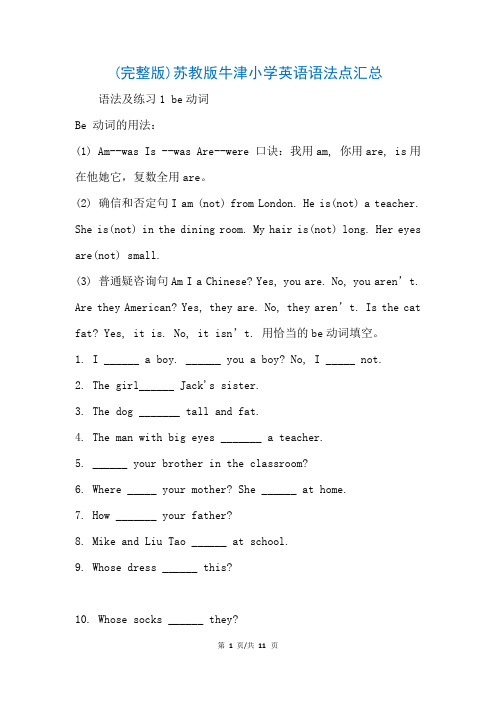
(完整版)苏教版牛津小学英语语法点汇总语法及练习1 be动词Be 动词的用法:(1) Am--was Is --was Are--were 口诀:我用am, 你用are, is用在他她它,复数全用are。
(2) 确信和否定句I am (not) from London. He is(not) a teacher. She is(not) in the dining room. My hair is(not) long. Her eyes are(not) small.(3) 普通疑咨询句Am I a Chinese? Yes, you are. No, you aren’t. Are they American? Yes, they are. No, they aren’t. Is the cat fat? Yes, it is. No, it isn’t. 用恰当的be动词填空。
1. I ______ a boy. ______ you a boy? No, I _____ not.2. The girl______ Jack's sister.3. The dog _______ tall and fat.4. The man with big eyes _______ a teacher.5. ______ your brother in the classroom?6. Where _____ your mother? She ______ at home.7. How _______ your father?8. Mike and Liu Tao ______ at school.9. Whose dress ______ this?10. Whose socks ______ they?11. That ______ my red skirt.12. Who ______ I?13.The jeans ______ on the desk.14. Here ______ a scarf for you.15. Here ______ some sweaters for you.16. The black gloves ______ for Su Yang.17. This pair of gloves ______ for Yang Ling.18. The two cups of milk _____ for me.19. Some tea ______ in the glass.20. Gao shan's shirt _______ over there.21. My sister's name ______Nancy.22. This ______ not Wang Fang's pencil.23. ______ David and Helen from England?24. There ______ a girl in the room.25. There ______ some apples on the tree.26. _______ there any kites in the classroom?27. _______ there any apple juice in the bottle?28. There _______ some bread on the plate.29. There _______ a boy, two girls, three men and ten women in the park.30. You, he and I ______ from China.语法及练习2 人称代词和物主代词人称代词和物主代词1.人称代词主格和宾格的区不:主格通常位于句中第一具动词之前(有时候位于than 之后),宾格普通位于动词或介词之后。
上海牛津小学英语语法知识总结
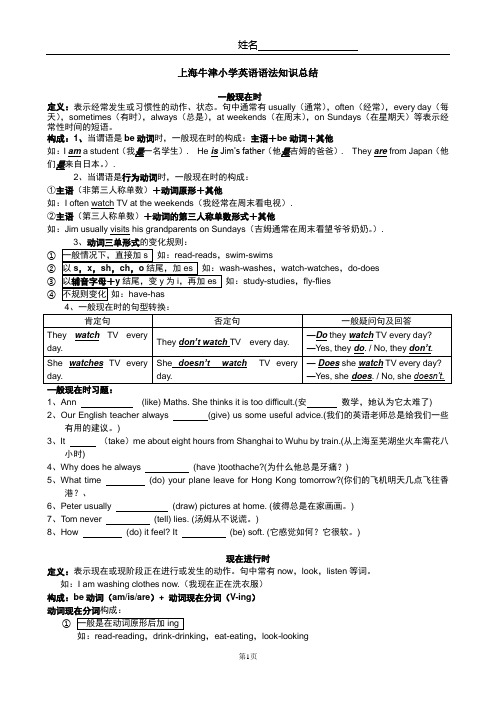
上海牛津小学英语语法知识总结一般现在时定义:表示经常发生或习惯性的动作、状态。
句中通常有usually(通常),often(经常),every day(每天),sometimes(有时),always(总是),at weekends(在周末),on Sundays(在星期天)等表示经常性时间的短语。
构成:1、当谓语是be动词时,一般现在时的构成:主语+be动词+其他如:I am a student(我是一名学生). He is Jim’s father(他是吉姆的爸爸). They are from Japan(他们是来自日本。
).2、当谓语是行为动词时,一般现在时的构成:①主语(非第三人称单数)+动词原形+其他如:I often watch TV at the weekends(我经常在周末看电视).②主语(第三人称单数)+动词的第三人称单数形式+其他如:Jim usually visits his grandparents on Sundays(吉姆通常在周末看望爷爷奶奶。
).①swim-swims②,watch-watches,do-does③如:study-studies,fly-flies④一般现在时习题:1、Ann (like) Maths. She thinks it is too difficult.(安数学,她认为它太难了)2、Our English teacher always (give) us some useful advice.(我们的英语老师总是给我们一些有用的建议。
)3、It (take)me about eight hours from Shanghai to Wuhu by train.(从上海至芜湖坐火车需花八小时)4、Why does he always (have )toothache?(为什么他总是牙痛?)5、What time (do) your plane leave for Hong Kong tomorrow?(你们的飞机明天几点飞往香港?、6、Peter usually (draw) pictures at home. (彼得总是在家画画。
深圳牛津英语 一至六年级语法汇总表
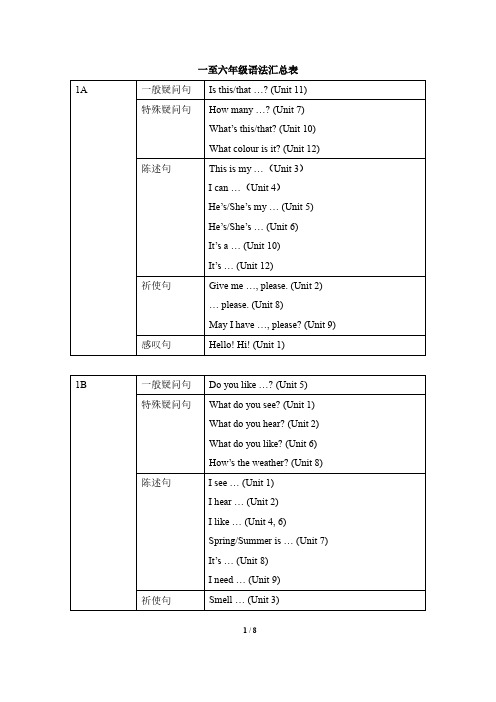
特殊疑问句
What does your mother do? She’s a nurse. (Unit 6) What would you like? I’d like some tomatoes. (Unit 8) Where is it? It’s on the table. (Unit 9) How many squares are there? There are two squares. (Unit 11) How’s the weather? It’s warm and sunny. (Unit 12)
3A
一般疑问句 特殊疑问句
Are you Kitty? Yes, I’m. (Unit 3) How are you? I’m fine. Thank you. (Unit 2) Who is he? He’s my father. (Unit 5) How much is it? (Unit 8) How much are they? (Unit 8) How many boys? Three boys. (Unit 10) What is it? It’s a rabbit. (Unit 11)
祈使句
Put … in / on … (Unit 8) Yes, please. (Unit 9) No, thanks. (Unit 9) Loot at … (Unit 11) Don’t … (Unit 12)
2B
一般疑问句
Is it …? (Unit 2) Can you hear …? (Unit 3) Do you like (doing) …? (Unit 4) Would you like some …? (Unit 5)
陈述句
上海牛津重点小学英语语法知识总结归纳

一般现在时1、定义:表示经常发生或习惯性的动作、状态。
句中通常有usually,often,everyday,sometimes,always,atweekends,onSundays等表示经常性时间的短语。
2、构成:1)当谓语是be动词时,一般现在时的构成:主语+be动词+其他如:’.2)当谓语是行为动词时,一般现在时的构成:①主语(非第三人称单数)+动词原形+其他如:IoftenwatchTVattheweekends.MrGreenandMrsGreenlikecollectingstamps.②主语(第三人称单数)+动词的第三人称单数形式+其他如:JimusuallyvisitshisgrandparentsonSundays.Shesometimesgoestotheparkwithhermother.3、动词三单形式的变化规则:•一般情况下,直接加s如:read-reads,swim-swims•以s,x,sh,ch,o结尾,加es如:wash-washes,watch-watches,do-does•以辅音字母+y结尾,变y为i,再加es如:study-studies,fly-flies•不规则变化如:have-has•4、一般现在时的句型转换:肯定句否定句一般疑问句及回答They watch TV everyday. They don’twatch TVeveryday.—Do they watch TVeveryday—Yes,they do./No,they don’t.She watches TV everyday. She doesn’twatchTVeveryday.—Does she watch TVeveryday—Yes,she does./No,she doesn’t.现在进行时1、定义:表示现在或现阶段正在进行或发生的动作。
句中常有now,look,listen等词。
上海牛津小学英语语法知识总结

上海牛津小学英语语法知识总结一般现在时1、定义:表示经常发生或习惯性的动作、状态.句中通常有usually,often,every day,sometimes,always,at weekends,on Sundays等表示经常性时间的短语。
2、构成:1)当谓语是be动词时,一般现在时的构成:主语+be动词+其他如:I am a student. He is Jim’s father. They are from Japan。
2)当谓语是行为动词时,一般现在时的构成:①主语(非第三人称单数)+动词原形+其他如:I often watch TV at the weekends.Mr Green and Mrs Green like collecting stamps。
②主语(第三人称单数)+动词的第三人称单数形式+其他如:Jim usually visits his grandparents on Sundays。
She sometimes goes to the park with her mother.3、动词三单形式的变化规则:①如:read—reads,swim—swims②如:wash—washes,watch-watches,do—does③如:study—studies,fly-flies④如:have-has4、一般现在时的句型转换:现在进行时1、定义:表示现在或现阶段正在进行或发生的动作.句中常有now,look ,listen 等词。
如:I am washing clothes now.Look ! Liu Tao is climbing the tree.Listen! Jane is singing in the music room.2、构成:be 动词(am/is/are )+ 动词现在分词(V-ing)3、动词现在分词构成:① 如:read-reading ,drink-drinking,eat-eating ,look —looking② 如:write-writing ,make —making ,ride-riding ,take-taking③ 如:sit —sitting ,swim-swimming ,put-putting ,run-running ,stop —stopping,get-getting ,begin —beginning ,jog —jogging,forget —forgetting4、动名词其实就是动词的现在分词,它既有名词性质(可作主语),又有动词性质(可带宾语)。
牛津版四年级上册英语语法总结

牛津版四年级上册英语语法总结引言本总结旨在帮助学生掌握牛津版四年级上册英语语法知识。
通过本总结,学生将能更好地理解和运用所学语法知识,提高英语表达能力。
语法点一:一般现在时1.1 定义一般现在时表示经常发生或习惯性的动作,通常和频度副词连用。
1.2 结构主语 + 动词原形/动词三单 + 其他1.3 示例- He goes to school by bus every day. - She likes reading books.语法点二:一般过去时2.1 定义一般过去时表示过去发生的事情。
2.2 结构主语 + 动词过去式 + 其他2.3 示例- He went to the park yesterday.- They played soccer last weekend.语法点三:一般将来时3.1 定义一般将来时表示将来会发生的事情。
3.2 结构主语 + will + 动词原形 + 其他3.3 示例- I will go to the movies tonight.- She is going to study abroad next year. 语法点四:现在进行时4.1 定义现在进行时表示正在进行的动作。
4.2 结构主语 + am/is/are + 动词现在分词 + 其他4.3 示例- He is reading a book now.- They are watching a movie in the living room. 语法点五:过去进行时5.1 定义过去进行时表示过去正在进行的动作。
5.2 结构主语 + was/were + 动词现在分词 + 其他5.3 示例- She was cooking dinner when I arrived. - They were playing music in the park.语法点六:情态动词6.1 定义情态动词表示可能性、能力、建议等。
6.2 常见情态动词- can, may, must, should, have to, need to 6.3 示例- He can swim very well.- You may leave now.结论通过以上总结,学生应能掌握牛津版四年级上册英语语法的主要知识点。
上海牛津英语六年级英语知识点整理

一、基础语法知识点:
1.句子的构成:主语+谓语+宾语;
2.时态的正确使用:一般现在时、一般过去时、一般将来时等;
3.动词的正确形式及用法:及物动词、不及物动词、系动词等;
4.祈使句的用法:表示请求、命令、建议等;
5.被动语态的用法:一般现在时、一般过去时、一般将来时等;
6. 句子的否定形式:用not把动词或动词短语置于句子前;
7. 祈使句的否定形式:用don’t/doesn’t let +主语+动词原形;
8. 情态动词should、would的用法:表示建议、意愿等;
9.特殊疑问句的构成:疑问词+一般疑问句的构成;
10.形容词、副词的比较级和最高级形式:用于表示物体之间的比较;
11. 名词性从句的引导词:what、who、which等;
12.过去进行时的用法;
二、词汇知识点:
1.常用名词、动词、形容词、副词的基本词义和用法;
2.常见的固定搭配、短语和习惯用法;
3.数词、时间词、量词的用法;
4.常用介词和介词短语的用法;
5.记录、理解并使用常用的固定句型和表达方式;
三、阅读技巧:
1.能够理解并提取文本中的关键信息;
2.能够根据文本内容进行推测和判断;
3.能够根据问题选择正确的答案;
4.能够理解并使用上下文线索;
5.能够根据语境理解单词和短语的意思;
四、写作技巧:
1.能够用正确的语法和用词写出简单连贯的句子;
2.能够运用所学的句型和句式进行书面表达;
3.能够用英语写简单的对话、日记、邮件等;
4.能够根据要求写出简单的说明文、记叙文等;。
上海牛津小学英语语法知识总结

上海牛津小学英语语法知识总结一般现在时1、定义:表示经常发生或习惯性的动作、状态。
句中通常有usually,often,every day,sometimes,always,at weekends,on Sundays等表示经常性时间的短语。
2、构成:1)当谓语是be动词时,一般现在时的构成:主语+be动词+其他如:I am a student. He is Jim’s father.They are from Japan.2)当谓语是行为动词时,一般现在时的构成:①主语(非第三人称单数)+动词原形+其他如:I often watch TV at the weekends.Mr Green and Mrs Green like collecting stamps.②主语(第三人称单数)+动词的第三人称单数形式+其他如:Jim usually visits his grandparents on Sundays.She sometimes goes to the park with her mother.3、动词三单形式的变化规则:•一般情况下,直接加s 如:read-reads,swim-swims•以s,x,sh,ch,o结尾,加es 如:wash-washes,watch-watches,do-does•以辅音字母+y结尾,变y为i,再加es 如:study-studies,fly-flies•不规则变化如:have-has4、一般现在时的句型转换:肯定句否定句一般疑问句及回答They watch TV every day. They don’t watch TVevery day.—Do they watch TV every day?—Yes, they do. / No, they don’t.She watches TV every day. She doesn’t watchTV every day.—Does she watch TV every day?—Yes, she does. / No, she doesn’t.现在进行时1、定义:表示现在或现阶段正在进行或发生的动作。
- 1、下载文档前请自行甄别文档内容的完整性,平台不提供额外的编辑、内容补充、找答案等附加服务。
- 2、"仅部分预览"的文档,不可在线预览部分如存在完整性等问题,可反馈申请退款(可完整预览的文档不适用该条件!)。
- 3、如文档侵犯您的权益,请联系客服反馈,我们会尽快为您处理(人工客服工作时间:9:00-18:30)。
实用文档牛津英语小学基础语法大全任务:1、口头练习 2、填入相应的人称代词。
3A(M1U4—M2U1中间)be动词一、定义:英语中的be动词就是汉语中的“是”。
二、(举例)1、I am a teacher. 我是一名教师。
2、You are a student. 你是一名学生。
3、He is a boy. 他是一个男孩。
4、She is a girl. 她是一个女孩。
5、It is a bird. 它是一只小鸟。
6、We are friends. 我们是朋友。
7、You are friends. 你们是朋友。
8、They are friends. 他(她它)们是朋友。
引出分类:is, am, are三、口诀:我用am,你用are,is跟着他她它,男他,女她,动物它,要问复数用什么,一律使用一个are。
四、缩写:I am = I'm It is =It'sYou are = You're We are = We'reHe is = He's You are = You'reShe is = She's They are = They're五、习题。
1、I _____ a student. 7、What _____ your name?2、He _____ a boy. 8、I _____ fine.3、Kitty _____ a cat. 9、We _____ girls.4、How _____ you? 10、You _____ Lucy.5、They _____ desks. 11、Ben _____ ten.6、It _____ a book. 12、实用文档The apple _____ on the tree.17 、You _____ very late. 、13Miss Wang _____ a teacher. 14、It _____ yellow.18、I _____ here. 15、They _____ red.19、Spotty _____ 16、a dog.Alice and Peter _____ students. 20、She _____ grandma.3A M2U2be动词引导的陈述句1、定义:陈述一项事实的句子。
2、分类:肯定句:表示肯定意义的句子(解释)。
否定句:表示否定意义的句子(解释)。
特点:3、)读成降调。
(3)首字母大写。
(2)句子以“.”(句号)结尾。
(1练习:4、区分陈述句(是陈述句的区分是肯定句还是否定句)name? What's your Is this a car? (7)(1)amother My father and my are desks. (8)(2) Theyin the park. She is a girl. re (3) you Kitty? Are Ben. (9)(4) He isn'tare you? (10) How (5) It isn't on the desk.is red. 6) The apple (5、肯定句与否定句的相互转换肯定句转化为否定句:(1)be动词后面加not。
动词,在方法:找出be orange The is not green. eg. The orange is green.2)否定句转化为肯定句:(动词后面的not。
方法:去掉be are a teacher. You are not a teacher. You eg.缩写、6t 3)are not=aren'is not 无缩写。
(2)not=isn't ((1)am7、练习:肯定句与否定句相互转换is (1)He in the zoo.)My name is Lucy. (2 'isnt happy. 3()SheI )am not ten. 4( good 'We 5()arent students.实用文档(6)Kitty is my good friend.(7)My grandma isn't in the room.(8)I'm tall.(9)You are Ben.(10)The bird isn't in the tree.be动词引导的一般疑问句1、定义:以推测口吻提问的句子。
eg. Are you a teacher?2、特点:(1)以be动词开头,首字母大写。
(2)以“?”结尾。
(3)句子读升调。
(4)用“yes”或“no”回答,再做简略回和(强调yes she isn't. is. eg. Is she tall? Yes, she No, 答。
no 后面的逗号)3、肯定句与一般疑问句之间的转换 1)肯定句变一般疑问句(方法: be动词,将be 动词提前,并大写首字母。
1)找到 2)原句中剩下的单词按原顺序照抄,句尾加“?” your be动词随人称的变化而变化。
we —> you, my —> 3)注意:II am not. you Are happy? Yes, I am. No, eg. I am happy.—>练习: (1) They are girls.It is an elephant. (2)is (3) Ben nine., m Dotty. (4) Ismall. (5) The cat isMy bag is big. (6)friends. (7) We areyellow. (8) The banana isare Kitty Li. (9) Youmy grandma. (10) She is方法:(2)一般疑问句变肯定句 1)找到主语。
(主语:一句话中主要说的人或者事物) 2)将主语提前,大写首字母。
3)剩下的句子按原顺序照抄。
(大写变小写,问号变句号) Be动词随人称的变化而变化。
)注意:4I we —>you, your—>my book. > your book?—It is my it eg. Isgirls. > Are you girls?—We aream > girl?you Are a —I a girl.实用文档练习:将一般疑问句变成肯定句(1)Are they friends?(2)Is Alice a student?(3)Is Sam hungry?(4)Is she eight?(5)Are you boys?(6)Is Lily a girl?(7)Is he your father?(8)Is Mr Li happy?(9)Are you a baby?(10)Is this your cat?3A M1名词单数变复数一、名词定义:表示事物名称的词。
二、分类:可数名词和不可数名词。
可数名词又可分为单数和复数。
三、名词单数变复数(1) 一般情况下, 词尾加-s, book→books bag→bags(2) 以s, x, ch, sh, 结尾加-es, bus→buses box→boxes watch→watchesbrush→brushes(3) 以辅音字母+y结尾, 把y→i加es, baby→babies (强调boy→boys) (4) 以辅音f/fe结尾, f/fe→v+es leaf→leaves wife→wives四、练习3AM4U2have, has 用法(1) have, has翻译为有。
(2) have用于第一人称,第二人称,第三人称复数。
e.g.: I have a mother. You have a pen. We have a teacher.They have books.(3) has用于第三人称单数。
(简称单三)e.g.:He has a bag. She has a bird. It has six legs.(4)练习用have, has填空1) books.Jim a ruler. 5) You a pe ncil.2) My mothera cat. 6) He a sist3) The dog a er.long tail. 7) My teachers bis cuits.4) They three8) Ben and Kitty实用文档a dog. 10) I a head.a 9) The boyruler.特殊疑问句结束3A , 直接提问的句子。
一.定义表示一无所知 +不完整的一般疑问句二.结构:特殊疑问词(组) you? old are How eg.: How are you?三.特点 1)特殊疑问词(组)开头2)以问号结尾 3)读成降调4)直接回答四.常见的特殊疑问词(组)对物提问 1)what 什么对人提问)who 谁 2 对地点提问 3)where 哪里对方式提问 4) how 怎么怎样对颜色提问 5)what colour 什么颜色对形状提问)what shape 什么形状 6 对年龄提问7) how old 多大对时间提问 8)what time 几点多)9how many对可数名词的数量提问少多 10)how much提数量数名词的对不可少少多问对价格提问钱谁 11)whose对物或人的主人提问的一哪 which 12)对特指的人或物提问个eg.What 1) is this? 这是什么你是谁? 2) Who are you ?3)Where is he? 他在哪里?好you? 你4) How arego do you to school? 你怎样去学校?吗? Howcat? 这只猫是什么颜色?What colour is the 5) is 6) hat shape it? 它是什么形状?you? old )7How are 你多大了?实用文档8)What time is it? 几点了?9)How many chicks are there? 有多少只小鸡?10)How much water is there? 有多少水? How much is the book? 这本书多少钱?11)Whose dog is it? 它是谁的狗?12)Which book do you like? 你喜欢哪本书?五.题型:对划线部分提问It is a book步骤:1) 翻译原句。
它是一本书。
2) 将划线部门盖上,再翻译一遍。
它是……3) 找出特殊疑问句词(组)代替……部分。
它是什么?确定“什么”为特殊疑问词即“what‖4) 特殊疑问词what 提前,大写首字母。
